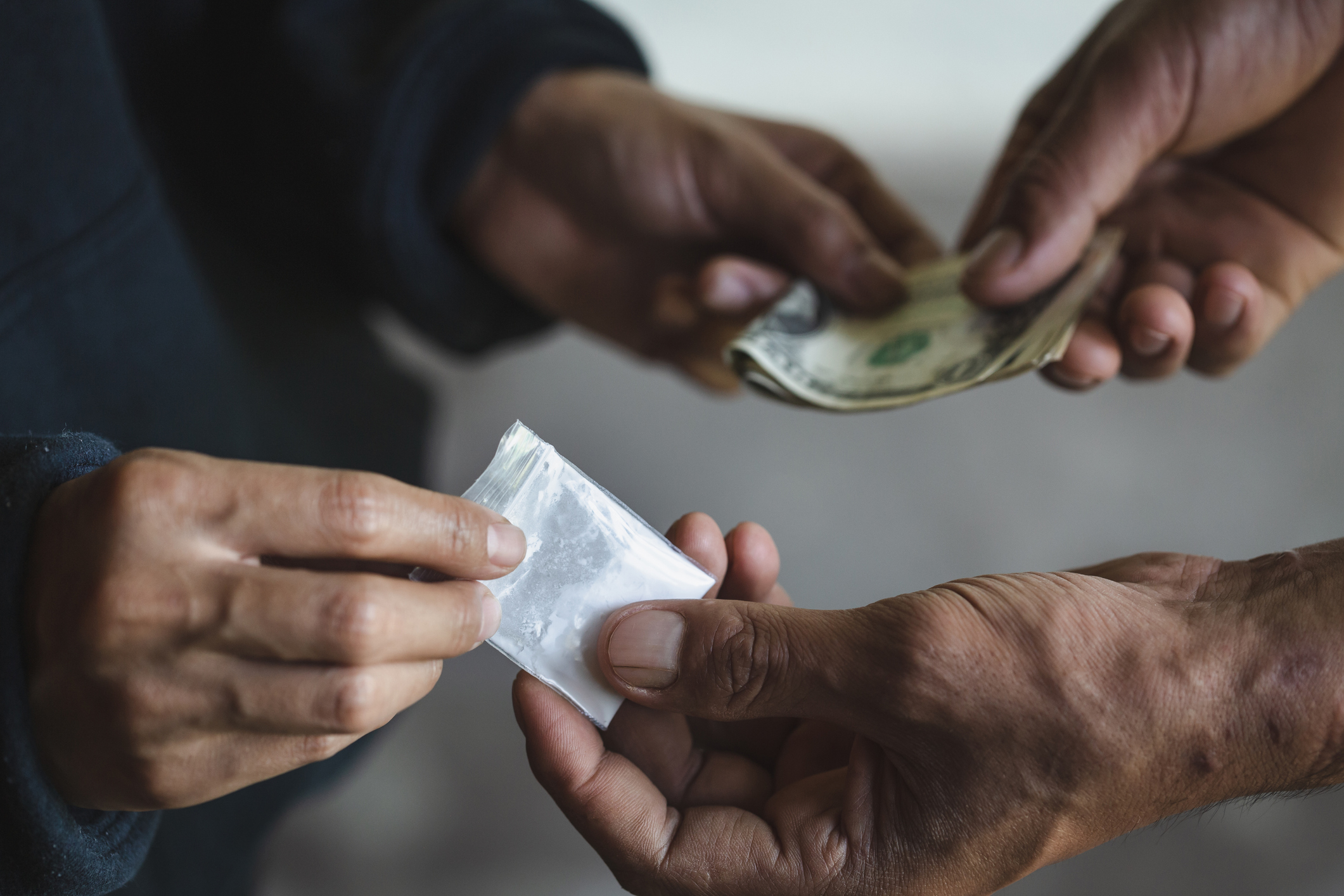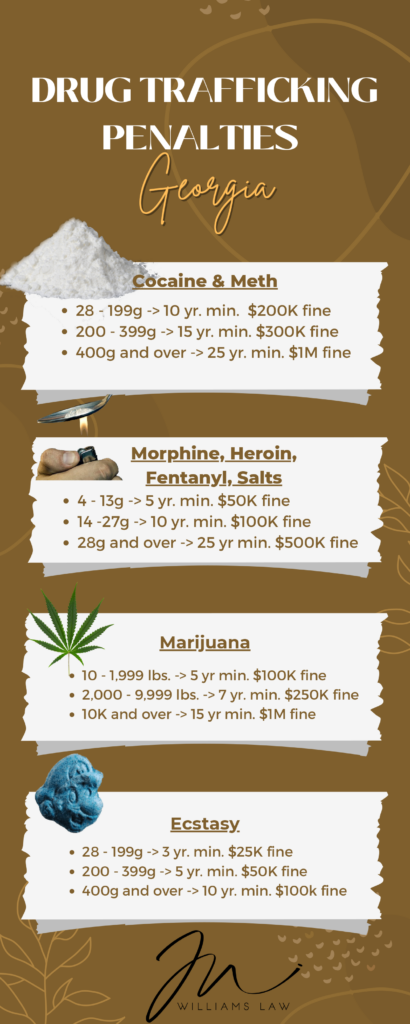
What are Drug Trafficking Charges OCGA § 16-13-31
In Georgia it is considered drug trafficking and against the law to sell, manufacture, deliver or bring into this state or to possess any of the following:
- Cocaine – 28 grams or more with a purity of 10% or more (if purity is less than 10%, then it is trafficking if the weight times the purity percentage is over 28 grams)
- Illegal Drugs – 4 grams or more of morphine, opium, any salt, isomer, including heroin and fentanyl
- Marijuana – 10 lbs. or more
- Methaqualone – 200 grams or more
- Methamphetamine – 28 grams or more
- MDMA – 28 grams or more
What are Drug Possession Charges OCGA § 16-13-30?
In State of Georgia, it is considered Drug Possession and against the law to purchase, possess or have under your control any drug or substances classified under Schedule I – Schedule V of the Georgia Code. The Georgia Controlled Substances Act classifies these drugs as follows:
Schedule I
Schedule I drugs are classified as drugs with no current medical use with high potential for abuse or addiction. These are the types of drugs that not even a pharmacist will have access to. Out of all drugs, the DEA labels these the most dangerous drugs. The following are all considered Schedule I substances under Georgia state law:
- Heroin
- LSD
- MDMA (Ecstasy)
- Psilocybin (Magic Mushrooms)
- Synthetic Marijuana (Spice)
- Mescaline (Peyote)
- Cannabis
Schedule II
Schedule II drugs are classified as drugs with a high potential for abuse, with use potentially leading to severe psychological or physical dependence. Unlike Schedule I, Schedule II controlled substances do have some current medical use and can be obtained through prescription. The following are examples of Schedule II drugs:
- PCP
- Oxycodone
- Cocaine
- Methamphetamine
- Amphetamine
- Fentanyl
- Vicodin
- Hydrocodone
Schedule III
Schedule II drugs are classified as drugs with a moderate to low potential for drug abuse. The risks of dependence are lower than that of Schedule I and II drugs, but less than that of Schedule IV or V. These are mostly prescription drugs, and usually not purchased over the counter. The following are example of Schedule III drugs:
- Testosterone
- Anabolic Steroids
- Ketamine
- Tylenol with Codeine
- Suboxone
Schedule IV
Schedule IV drugs are defined as drugs with a low potential for abuse and lower risk of dependence. Common examples of Schedule IV drugs are any of the following:
- Xanax
- Soma
- Valium
- Ambien
- Tramadol
- Ativan
- Klonopin
Schedule V
Schedule V are drugs with the lowest potential for abuse or dependency or misuse. All of the following are considered Schedule V drugs:
- OTC Cough Syrup
- Pseudoephedrine
- Robitussin AC
- Ezogabine
What is the difference between Drug Trafficking and Drug Possession?
- The Drug – The Georgia Drug Trafficking law only covers a few types of drugs. The trafficking statute covers Cocaine, Methamphetamine, Marijuana, Ecstasy, Morphine/Isomer Salts, and Methaqualone. If none of the above drugs are possessed, then you cannot be charged and convicted of the offense of trafficking. The Drug Possession statute covers the whole gambit of drugs and their schedules. It is much more encompassing and broader than the Drug Trafficking statute for that very reason.
- The Amount of Drugs– You can only be charged and convicted of Drug Trafficking if you possess over a certain amount of the substances above. For cocaine, methamphetamine and MDMA, you must possess at least 28 grams. For morphine, you must possess at least 4 grams. The quantity of marijuana must be at least 10 lbs. If you don’t possess that much of one of the six forbidden substances, then you will likely only be charged and potentially convicted of Drug Possession or Possession with Intent to Distribute instead of Drug Trafficking.
Another key difference is that trafficking does not only include the possession of the substances. Trafficking can also apply if the substances are sold, manufactured, grown, delivered, or brought into the state. Possession alone occurs when a person purchases or has under his control any controlled substance.
What are the Defenses against Drug Trafficking?
Many people want to know how to beat a drug trafficking case. The first step in the process is to schedule a free consultation with a criminal lawyer near you. You should follow your attorney’s legal advice and perform your own legal research as well. Doing your own homework can help your attorney represent you better. The way to beat a drug trafficking case is by working with your criminal defense attorney and by using any of the following defenses:
Illegal Search and Seizure – Law enforcement officers must adhere to particular protocols when they investigate and arrest you. If they violate those protocols, they may be violating your constitutional rights.
A violation of your constitutional rights may be reason to dispute the Drug Trafficking charge.
For example, your Fourth Amendment rights are meant to protect you from illegal search and seizure. A police officer may have searched your car without probable cause to believe you were breaking the law.
In such a case, you may be able to argue that the evidence found as a result of that unlawful search should be suppressed and excluded at trial.
Lack of Control, Possession, or Knowledge
A key element of Drug Trafficking is the intent to commit the crime. You may not have had any intent to possess drugs. For example, maybe you borrowed a friend’s car that unbeknownst to you had over 28 grams cocaine in it. If the police find it and you’re charged with trafficking cocaine, you should not be convicted because you had no knowledge, actual possession, or constructive possession of the drugs.
Another common defense used in Drug Trafficking charges is the Equal Access Rule. Georgia law has made it clear that the State must prove that you had knowledge of and exclusive control over the substance. It can be difficult for the State to prove this if other individuals had equal access to the substance or area where the substance was found. If it can be shown that others had equal access, then it allows your defense lawyer to make the argument that the drugs were placed there and belong to someone other than you. Unfortunately, this defense does not work if you and the other persons with equal access are alleged to be in joint constructive possession of the contraband.
Entrapment
Entrapment occurs if you are solicited by a government agent to commit a drug offense. To be successful, it must be shown that the agent used undue persuasion against you to get you to violate the law. The idea of committing the drug offense must have also originated with the agent and not you.
Entrapment is a difficult defense. It’s rarely used and even more rarely won.
Insufficient Evidence
The District Attorney has the burden of proving guilt. They must prove your guilt beyond a reasonable doubt. If it’s reasonable to believe that you did not possess the substance, then you can’t be guilty. If it’s reasonable to believe that the substance doesn’t weigh the amount required under the law, then you can’t be guilty. If it’s reasonable to believe that the substance isn’t one of the six covered under the trafficking law, then you can’t be guilty.
A good criminal defense attorney can cast reasonable doubt on the Government’s theory. Arguing insufficient evidence to convict is probably the most common defense we have.
What are the penalties for drug Trafficking charges?
Unlike many other felony offenses and misdemeanor offenses, Drug Trafficking penalties carry with them mandatory minimum prison sentences. Some or all of that time can be probated, but these mandatory minimum sentences can really tie the sentencing court’s hands. Even if the judge wants to sentence you to less time than the mandatory minimum, under the drug trafficking code section he will be unable to do so. There are also hefty fines associated with this crime.
The following chart is a quick illustration of the drug trafficking penalties:

The chart above does not include methaqualone, which is also referred to as quaaludes. Quaaludes are not as common as they use to be in the 1970s, but the following penalties apply to Methaqualone:
Methaqualone
200 – 400 grams -> 5 year minimum and 50k fine
Over 400 grams -> 15 year minimum and 250k fine
It should also be noted that the abuse of methamphetamine has led to an ample amount of criminal conduct and drug crimes by addicts. As a way to encourage people to stop making meth, the Georgia legislature has added just the manufacturing of methamphetamine to the drug trafficking code section of the drug laws. The following applies to manufacturing methamphetamine:
“Manufacturing” Methamphetamine
Less than 200 grams -> 10 year min. and 200k fine
200 – 400 grams -> 15 year minimum and 300k fine
More than 400 grams -> 25 year minimum and 1 million fine
How Can I Reduce Drug Trafficking Penalties If I Know I’m Guilty?
Sometimes, your criminal lawyer might not have much to work with. If the State has you ‘dead to rights’ you and your attorney must get creative. Unfortunately, the mandatory minimums associated with drug trafficking crimes are mandatory. The court cannot deviate from the minimum sentences.
If you’re caught trafficking, you know you’re caught, your attorney knows you’re caught, and the government knows it, it might be in your best interest to give substantial assistance to the government. Substantial assistance applies in State cases and Federal court cases.
If you elect to go this route, you will be required to tell the Government the absolute 100% God’s honest truth. If you have any reservations about being this truthful, then you’re better off not doing it. The government will decide whether your cooperation is substantial. In trafficking cases, the government is usually interested in knowing where the excessive amounts of drugs came from. If you are able to provide the government with this information, the government might agree to reduce your charges to simple possession or possession with intent to distribute. Those charges are still felonies, but they do not carry mandatory minimums.
In Federal cases, substantial assistance works the same way. If you give substantial assistance, the Court can depart from the guidelines and sentence you to a term of imprisonment below the mandatory minimum.
At times, providing information to the government can be beneficial. At other times, it’s just not worth it. The information that you provide to the government will be sent to the individual that you are telling on. You could be called as a witness to testify against that person. Depending on who you are throwing under the bus, that can be pretty scary for you and your family. Unless you have a lot to gain or nothing to lose from giving assistance, it might not be worth it.
Contact A Drug Trafficking Lawyer Today
If you are facing drug trafficking charges, it is important that you contact a criminal defense attorney as soon as possible for legal advice. At Joseph Williams Law, our attorney has represented several clients charged with drug offenses. We realize how serious the penalties are in trafficking cases, and we promise to be by your side the entire way. Please contact us online for a free consultation today.
